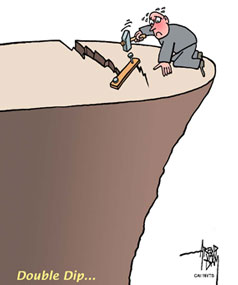Honest, paywall-free news is rare. Please support our boldly independent journalism with a donation of any size.
Mervyn King, governor of the Bank of England, has crossed the line by acting as cheerleader for the Conservative Party’s policies of making deep cuts in public spending — cuts that have affected everything from university tuition fees to tax breaks for families.
“The last thing you ever want is for the Bank of England to be drawn into the political arena,” Ed Balls, the shadow chancellor and a spokesman for the opposition Labour Party, told the Financial Times in an interview on Feb. 17. Mr. Balls has criticized the governor for publicly backing the harsh austerity policies, which Mr. Balls says could spark a double-dip recession and more unemployment in Britain.
He maintains that Mr. King’s stance is politically motivated. “Central bank governors have to be very careful about tying themselves too closely to fiscal strategies, especially when they are extreme and are making their job on monetary policy more complicated,” he said.
Mr. Balls is right; Mr. King has been busy defending the Conservative government’s economic strategy lately and has urged officials to stick to their plans for further cuts. The governor is wrong on economics — spending cuts are the wrong policy for a still-depressed economy — but that’s not key to the argument. Rather, the point is that if an independent central bank is to retain the public trust, the people running that bank have to be careful to stay above the political fray.
Mr. King’s politicking recalls the actions of Alan Greenspan, chairman of the United States Federal Reserve from 1987 to 2006, who was a stern advocate of fiscal discipline — until a Republican, George W. Bush, was in the White House, and Mr. Greenspan suddenly declared that the United States needed to cut taxes in 2001 to prevent too rapid a reduction in national debt.
It’s very sad to see Mr. King going down the same path. Now, I was critical of Mr. Greenspan back when he was still a god in the American pantheon — when he supported not only tax cuts but, in 2005, also supported the privatization of Social Security. I have many failings, but an unwillingness to criticize powerful people isn’t one of them.
That said, some may wonder why I have not expressed similar disapproval of Ben S. Bernanke, the current Fed chairman.
There is a good reason: he’s not as bad an actor. You can argue that he has made bad decisions, and also that he has been too easy on the banks. You can even fault Mr. Bernanke for brushing off warnings in the early part of the last decade about the troubled housing market in the United States.
But he hasn’t engaged in the kind of unacceptable raw partisan advocacy that Mr. Greenspan did then and Mr. King is now.
Backstory: Britain’s Austerity Test
Central bankers generally try to stay out of politics. So it is surprising that Mervyn King, a governor at the Bank of England, has been speaking publicly in favor of Chancellor of the Exchequer George Osborne’s deficit-reduction plans.
Mr. King’s endorsement of the British government’s austerity program under Prime Minister David Cameron has drawn both criticism and support from officials on either side of the debate. The critics, led by shadow chancellor Ed Balls of the Labour Party, say that the central bank’s current involvement in fiscal policies, especially politically controversial ones like harsh spending cuts, risks the bank’s reputation for objectivity. They add that Mr. King is supporting fiscal consolidation plans that might push the nation toward a double-dip recession.
Others, including David Cameron, Britain’s prime minister, find Mr. King’s support for austerity timely and necessary, and Mr. Cameron has condemned critics’ attacks on Mr. King’s pro-government stance.
At the center of the debate is the question of what course of action the government and central bank officials should take to stem rising inflation in Britain. Consumer prices rose 4 percent in January, to their highest levels in two years, and Britain has missed its inflation target of 2 percent for the last 14 consecutive months. Price increases on goods and services mean that there is tremendous pressure on the Bank of England’s Monetary Policy Committee to raise interest rates.
Mr. King blames the overall rise in consumer costs on higher prices of basic commodities and increased sales taxes, a temporary trend that he says will reverse in 2012. Tightening interest rates now, he says, might completely stifle Britain’s still-weak economy.
Trump is silencing political dissent. We appeal for your support.
Progressive nonprofits are the latest target caught in Trump’s crosshairs. With the aim of eliminating political opposition, Trump and his sycophants are working to curb government funding, constrain private foundations, and even cut tax-exempt status from organizations he dislikes.
We’re concerned, because Truthout is not immune to such bad-faith attacks.
We can only resist Trump’s attacks by cultivating a strong base of support. The right-wing mediasphere is funded comfortably by billionaire owners and venture capitalist philanthropists. At Truthout, we have you.
Truthout has launched a fundraiser, and we have only 48 hours left to raise $21,000. Please take a meaningful action in the fight against authoritarianism: make a one-time or monthly donation to Truthout. If you have the means, please dig deep.
